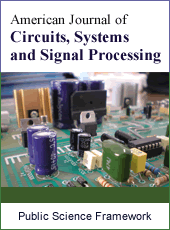American Journal of Circuits, Systems and Signal Processing
Articles Information
American Journal of Circuits, Systems and Signal Processing, Vol.1, No.1, Apr. 2015, Pub. Date: May 13, 2015
Ontology Similarity Measuring and Ontology Mapping Algorithms Based on Fused Lasso Signal Approximator
Pages: 14-19 Views: 4513 Downloads: 1283
[01]
Yun Gao, Department of Editorial, Yunnan Normal University, Kunming, China.
[02]
Wei Gao, School of Information Science and Technology, Yunnan Normal University, Kunming, China.
Ontology similarity calculation is important research topics in information retrieval and widely used in science and engineering. By analyzing the technology of fused lasso signal approximator, we propose the new algorithm for ontology similarity measure and ontology mapping. Via the ontology sparse vector learning, the ontology graph is mapped into a line consists of real numbers. The similarity between two concepts then can be measured by comparing the difference between their corresponding real numbers. The experiment results show that the proposed new algorithm has high accuracy and efficiency on ontology similarity calculation and ontology mapping.
Ontology, Similarity Measure, Ontology Mapping, Sparse Vector, Fused Lasso Signal Approximator
[01]
J. M. Przydzial, B. Bhhatarai, and A. Koleti, GPCR ontology: development and application of a G protein-coupled receptor pharmacology knowledge framework. Bioinformatics, 29(24) (2013) 3211-3219.
[02]
S. Koehler, S. C. Doelken, and C. J. Mungall, The human phenotype ontology project: linking molecular biology and disease through phenotype data. Nucleic Acids Research, 42(D1) (2014) 966-974.
[03]
M. Ivanovic and Z. Budimac, An overview of ontologies and data resources in medical domains. Expert Systerms and Applications, 41(11) (2014) 5158-15166.
[04]
A. Hristoskova, V. Sakkalis, and G. Zacharioudakis, Ontology-driven monitoring of patient's vital signs enabling personalized medical detection and alert. Sensors, 14(1) (2014) 1598-1628.
[05]
M. A. Kabir, J. Han, and J. Yu, User-centric social context information management: an ontology-based approach and platform. Personal and Ubiquitous Computing, 18(3) (2014) 1061-1083.
[06]
Y. L. Ma, L. Liu, K. Lu, B. H. Jin, and X. J. Liu, A graph derivation based approach for measuring and comparing structural semantics of ontologies. IEEE Transactions on Knowledge and Data Engineering, 26(3) (2014) 1039-1052.
[07]
Z. Li, H. S. Guo, Y. S. Yuan, and L. B. Sun, Ontology representation of online shopping customers knowledge in enterprise information. Applied Mechanics and Materials, 483(2014) 603-606.
[08]
R. Santodomingo, S., Rohjans, M. Uslar, J. A. Rodriguez-Mondejar, and M.A. Sanz-Bobi, Ontology matching system for future energy smart grids. Engineering Applications of Artificial Intelligence, 32(2014) 242-257.
[09]
T. Pizzuti, G. Mirabelli, M. A. Sanz-Bobi, and F. Gomez-Gonzalez, Food Track & Trace ontology for helping the food traceability control. Journal of Food Engineering, 120(1) (2014) 17-30.
[10]
N. Lasierra, A. Alesanco, and J. Garcia, Designing an architecture for monitoring patients at home: Ontologies and web services for clinical and technical management integration. IEEE Journal of Biomedical and Health Informatics, 18(3) (2014) 896-906.
[11]
Y. Y. Wang, W. Gao, Y. G. Zhang, and Y. Gao, Ontology similarity computation use ranking learning Method. The 3rd International Conference on Computational Intelligence and Industrial Application, Wuhan, China, 2010, pp. 20-22.
[12]
X. Huang, T. W. Xu, W. Gao, and Z. Y. Jia, Ontology similarity measure and ontology mapping via fast ranking method. International Journal of Applied Physics and Mathematics, 1(2011) 54-59.
[13]
W. Gao, and L. Liang, Ontology similarity measure by optimizing NDCG measure and application in physics education. Future Communication, Computing, Control and Management, 142(2011) 415-421.
[14]
Y. Gao, and W. Gao, Ontology similarity measure and ontology mapping via learning optimization similarity function. International Journal of Machine Learning and Computing, 2(2) (2012) 107-112.
[15]
X. Huang, T. W. Xu, W. Gao, and S. Gong, Ontology similarity measure and ontology mapping using half transductive ranking. In Proceedings of 2011 4th IEEE international conference on computer science and Information technology, Chengdu, China, 2011, pp. 571-574.
[16]
W. Gao, Y. Gao, and L. Liang, Diffusion and harmonic analysis on hypergraph and application in ontology similarity measure and ontology mapping. Journal of Chemical and Pharmaceutical Research, 5(9) (2013) 592-598.
[17]
W. Gao and L. Shi, Ontology similarity measure algorithm with operational cost and application in biology science. BioTechnology: An Indian Journal, 8(11) (2013) 1572-1577.
[18]
W. Gao and T. W. Xu, Ontology similarity measuring and ontology mapping algorithm based on MEE criterion. Energy Education Science and Technology Part A: Energy Science and Research, 32(3) (2014) 3793-3806.
[19]
W. Gao, Y. Gao, and Y. G. Zhang, Strong and weak stability of k-partite ranking algorithm. Information, 15(11A) (2012) 4585-4590.
[20]
W. Gao and T. W. Xu, Stability analysis of learning algorithms for ontology similarity computation. Abstract and Applied Analysis, 2013, 9 pages, http://dx.doi.org/10.1155/2013/174802.
[21]
W. Gao and L. L. Zhu, Gradient learning algorithms for ontology computing. Computational Intelligence and Neuroscience, 2014, 12 pages, http://dx.doi.org/10.1155/2014/438291.
[22]
W. Gao, L. Yan, and L. Liang, Piecewise function approximation and vertex partitioning schemes for multi-dividing ontology algorithm in AUC criterion setting (I). International Journal of Computer Applications in Technology, 50 (3/4) (2014) 226-231.
[23]
L. Wang, Y. You, H. Lian, A simple and efficient algorithm for fused lasso signal approximator with convex loss function, Comput Stat., (2013) 28:1699–1714.
[24]
N. Craswell and D. Hawking, Overview of the TREC 2003 web track. Proceeding of the Twelfth Text Retrieval Conference, Gaithersburg, Maryland, NIST Special Publication, 2003, pp. 78-92.

ISSN Print: 2381-7194
ISSN Online: 2381-7208
Current Issue:
Vol. 6, Issue 1, March Submit a Manuscript Join Editorial Board Join Reviewer Team
ISSN Online: 2381-7208
Current Issue:
Vol. 6, Issue 1, March Submit a Manuscript Join Editorial Board Join Reviewer Team
| About This Journal |
| All Issues |
| Open Access |
| Indexing |
| Payment Information |
| Author Guidelines |
| Review Process |
| Publication Ethics |
| Editorial Board |
| Peer Reviewers |


